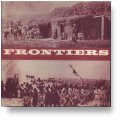LPs
Frontiers

Folkways FR 1003
A Co-production of Folkways and Scholastic Book Services For Use as a Teaching Aid
1964
Side I
- Band 1: THE PIONEER
- Shoot the Buffalo
- Groundhog
- Rattlesnake
- Mountain Lion
- Thunderstorm
- Flash Flood
- Ox Driver
- Handcart Song
- Crossing the Plains
- Elsie Armstrong
- This Old Man
- Rules of the Board of Trustees
- The Magnetic Doctress
- Band 2: THE INDIAN
- Starved Rock
- War Song -- Flathead Indians
- Honoring Song -- Sioux
- Silversmith -- Navajo
- Squaw Dance -- Sioux
- Band 3: THE COWBOY
- Morning Grub Holler
- Brag Talk
- Strawberry Roan

Side II
- Band 1: THE BENT COUNTY BACHELOR
- Band 2: BUFFALO SKINNERS
- Band 3: SACRAMENTO
- Band 4: SIOUX INDIANS
- Band 5: ST. GEORGE
- Band 6: THE TEXIAN BOYS
- Band 7: WILD BILL HICKOCK
- Band 8: PILGRIM AND A STRANGER
- Band 9: GO LONG L'IL DOGIES
Participating artists:
- Ed McCurdy
- L.M. Hilton
- Logan English
- Keith Clark
- Cisco Houston
- Harry Jackson
- Sam Hinton
- Hermes Nye
- Robert Emmett
- and others
I do not have this LP, but a kind correspondent informed me that the only Cisco cut is The Chisholm Trail from the Cowboy Ballads LP. And of course, this song is not even listed in the contents I have managed to find. Oh well...not so eager to find it now.
I did find this review, or portion of a review, sneering with the "I'm more authentic than you" tone I deride Here.
Review:
Likewise, we can be thankful only for small favors in records designed for schoolroom use. "Frontiers" (Folkways FR 10003), "especially created for Scholastic Literature Units, Scholastic Book Services" is not stated to be a recording of folk music, but the implication is there. Of the performances designed to "bring pleasure and add profit to your students' experiences in 'Frontiers'", and mostly selected from previously issued recordings, only some of the Indian music, a Mormon song from L.M. Hilton, and possibly some of the work of Harry Jackson are traditional performances. Whatever the merits of the unidentified performers (including Ed McCurdy, Pete Seeger, Sam Hinton, Hermes Nye and Logan English) they should have been replaced by traditional singers. Worst of all is the inclusion of four songs written and performed by Keith Clark. Is it any wonder we are producing a generation which believes that folksingers are developed in coffee houses?
A Response:
Bill Adams
Surely, among the real cowboys, the real seamen, the real loggers, and the real hoboes, some had voices like Harry Jackson, which I find hard to listen to, and some sounded more like Johnny Cash. (Cash, after all, was really poor, really picked cotton, really grew up in rural Arkansas, really served in the Air Force, and really sold merchandise door-to-door before finding Sam Phillips at Sun Records.) I don't think Johnny or Cisco ever had a singing lesson except in the choir in junior high and early high school. When I was growing up, "real singers" were Frank Sinatra and Tony Bennett, and nobody wanted to listen to Woody himself or to Bob Dylan, even. That's the whole reason for all the smooth-sounding folk groups in the late '50's like the Kingston Trio, Brothers Four, Chad Mitchell Trio, New Christy Minstrels, etc.----they took the songs of Guthrie and Leadbelly and "traditional" which simply means "unknown author" and made them into an experience palpable to the masses. Listening to them led me to the sources, and prepared me to overlook the rough-hewn quality of the vocals or instrumentals. By the time I was 25, I liked Sinatra AND Guthrie, the Kingston Trio AND The Carter Family, Tony Bennett AND Sam Hinton, Burl Ives AND Mississippi John Hurt.
We welcome any suggestions, contributions, or questions. You send it, we'll consider using it. Help us spread the word. And the music. And thanks for visiting.

